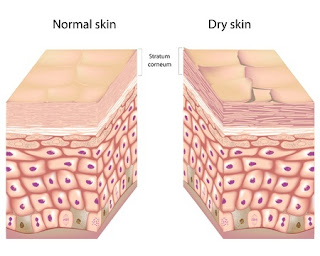Dry skin, also called xerosis, is a very common skin condition that occurs at
all ages. Usually, it doesn't represent a serious problem but sometimes it can
be difficult to treat. Moreover, it might be correlated to other skin diseases
or associated to pathological conditions such as diabetes, hypothyroidism and
hyperthyroidism, Sjögren syndrome, malnutrition.
Dermatitis (sometimes called eczema) is inflammation of the upper layers of
the skin, causing itching, blisters, redness, swelling, and often oozing,
scabbing, and scaling.
Known causes include dry skin, contact with a particular substance, certain
drugs, varicose veins, and constant scratching.
Typical symptoms include a red itchy rash, blisters, open sores, oozing,
crusting, and scaling.
The diagnosis is typically based on symptoms and confirmed by results of skin
tests or skin samples or the presence of suspected drugs, irritants, or
infection.
Avoiding known irritants and allergens reduces the risk of dermatitis.
Treatment depends on the cause and the specific symptoms.
What Causes of dermatitis
A number of health conditions, allergies, genetic factors and irritants can
cause different types of dermatitis:
Atopic dermatitis (eczema). This form of dermatitis is likely related to a
mix of factors, including dry skin, a gene variation, an immune system
dysfunction, bacteria on the skin and environmental conditions.
Contact dermatitis. This condition results from direct contact with one of
many irritants or allergens — such as poison ivy, jewelry containing nickel,
cleaning products, perfumes, cosmetics, and even preservatives in many creams
and lotions.
Seborrheic dermatitis. This condition may be caused by a yeast (fungus) that
is in the oil secretion on the skin. People with seborrheic dermatitis may
notice their condition tends to come and go depending on the season.
Toxic substances that can cause irritant contact dermatitis include:
battery acid
bleach
drain cleaners
kerosene
detergents
pepper spray
Cause of Dry Skin
Though most cases of dry skin (xerosis) have an environmental cause, certain
diseases also can significantly affect your skin. Potential causes of dry skin
include:
Weather. In general, your skin is driest in winter, when temperatures and
humidity levels plummet. But the reverse may be true if you live in desert
regions, where temperatures can soar, but humidity levels remain low.
Heat. Central heating, wood-burning stoves, space heaters and fireplaces all
reduce humidity and dry your skin.
Hot baths and showers. Taking long, hot showers or baths can dry your skin.
So can frequent swimming, particularly in heavily chlorinated pools.
Harsh soaps and detergents. Many popular soaps and detergents strip moisture
from your skin. Deodorant and antibacterial soaps are usually the most damaging.
Many shampoos may dry your scalp.
Sun exposure. Sun dries your skin, and its ultraviolet (UV) radiation
penetrates far beyond the top layer of skin. The most significant damage occurs
deeper, leading to deep wrinkles and loose, sagging skin.
Other skin conditions. People with skin conditions like atopic dermatitis
(eczema) or a skin condition marked by a rapid buildup of rough, dry, dead skin
cells that form thick scales (psoriasis) are prone to dry skin.

No comments:
Post a Comment